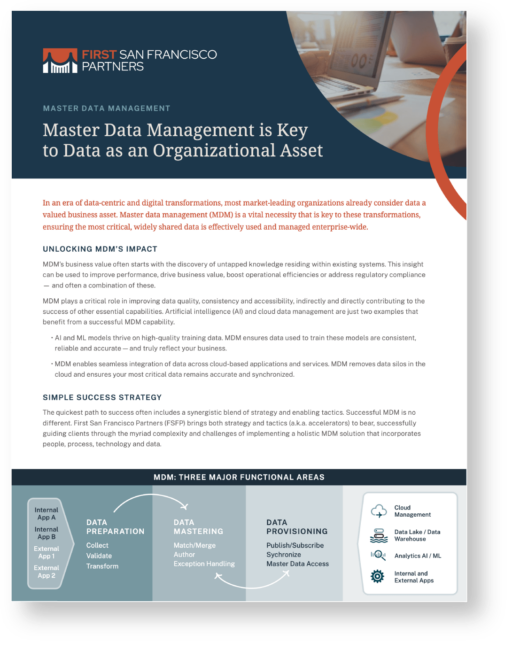Master Data Management
Inconsistencies result if data shared across systems isn’t properly reconciled and normalized — but setting up a process to do so can be difficult.
It all comes down to what’s called master data — “entity” data about customers, suppliers, partners, products, materials and accounts that is used with each transaction, application, report and decision. Effectively managed and integrated, this data can deliver the insights necessary to improve decision making — driving measurable business success. Unmanaged, it represents a wasted opportunity.

That’s where First San Francisco Partners’ (FSFP) master data management (MDM) expertise comes in. Our team has decades of experience helping organizations conceptualize and deploy the processes and technologies necessary to gain a single, reliable view of master data.
FSFP’s MDM specialists can help your business:
- Create business, technical and architectural requirements
- Identify operating and engagement models to facilitate effective decision-making and efficient operational processes
- Scope a realistic MDM implementation plan and effort
- Prioritize data domains and supporting processes based on business value
- Implement a market-leading single, or multi-domain MDM capability
- Identify and implement value-added technologies such as data quality and metadata management
MDM is Key to Data as an Organizational Asset
FSFP combines strategic insights and tactical expertise to successfully guide our clients through the complexities and challenges of a holistic MDM solution that incorporates people, processes, technology, and data.

Reference Data Management
Mastering data used for classification such as code tables, lookups and domains.
Reference data is used to represent a vast array of business concepts that are important in such diverse activities as segmentation, driving business rules, and reporting to customers and regulators.
In many enterprises, the number of business concepts represented by reference data far exceeds that represented by tables and columns implemented in databases. Problems occur when reference data is not synchronized across the enterprise, and are not understood clearly — or not even known about — by the people who have to use them.

FSFP has a deep understanding of Reference Data Management. Our consultants have set up central RDM units in very large enterprises, and streamlined RDM in other enterprises that do not need a centralized approach. Our RDM methodology emphasizes getting reference data right from the beginning and making sure it is efficiently delivered to the places that need it. RDM tools continue to grow in sophistication, and while we are happy to work with them, many clients still want successful RDM in environments without specialized tooling.
Key elements of FSFP’s Reference Data Management methodology are:
- Dealing with the unique requirements of “external” reference data (which comes from outside the enterprise) versus the unique requirements of “internal” reference data (which is produced wholly within the enterprise)
- Understanding the many different roles involved in RDM and making sure the people playing these roles are well-trained and have all the tools and techniques they need to be successful
- Recognizing that producing reference data is quite different to distributing it, and that an integrated supply chain for reference data is put in place
- Making sure the content of reference data is as high quality as possible; not only must there be zero defects, but content like definitions must be complete, accurate, and consumable
- Handling complexities like hierarchies, crosswalks, splits, merges and standard conversions
Want To Read About Master Data Management?
Want to talk master
data management or
reference data
management?
We’d love to understand your goals and challenges — and help you navigate opportunities to extract full value on your data journey.


